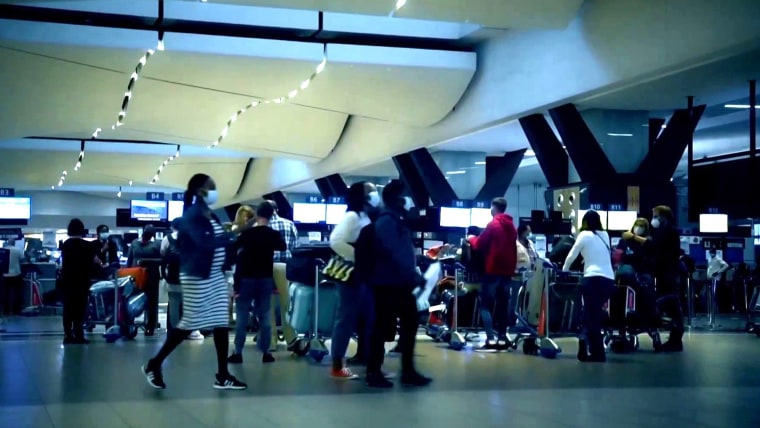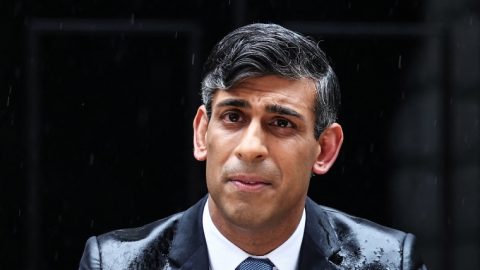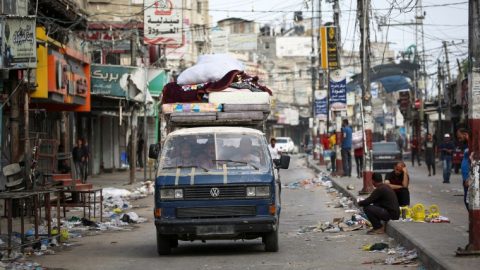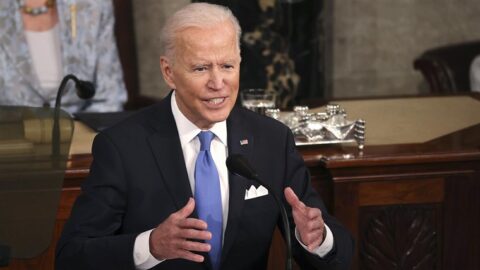LONDON — The global risk of the new omicron variant is “very high,” the World Health Organization said Monday, as more countries reported cases of the variant, sparking worldwide concern that there is more pandemic suffering ahead.
In response to the spike in cases, an increasing number of nations are tightening their borders despite pleas for caution and outbursts of dismay from some.
“Omicron’s very emergence is another reminder that although many of us might think we’re done with Covid-19, it’s not done with us,” Tedros Adhanom Ghebreyesus, director-general of the World Health Organization, told a special session of the World Health Assembly.
In advice to its member states, the U.N. agency urged them to accelerate Covid-19 vaccination coverage “as rapidly as possible,” particularly among high-priority groups, and to enhance surveillance and sequencing efforts.
“Omicron has an unprecedented number of spike mutations, some of which are concerning for their potential impact on the trajectory of the pandemic,” the body said in the report it tweeted out. “If another major surge of Covid-19 takes place driven by omicron, consequences may be severe.”
The new variant was first detected in southern Africa last week, and has now been detected in countries around the world. Meanwhile, cases in Scotland and Portugal suggest that the variant may already be spreading outside the southern African region.
“There might already be some community transmission of this variant in Scotland,” First Minister Nicola Sturgeon said after the country reported its first six cases.
Health officials in Portugal said the country had detected 13 cases among team members of a professional soccer club, according to The Associated Press. One of those who tested positive at the Lisbon-based Belenenses soccer club had recently traveled to South Africa.
Quarantining became an issue in the Netherlands, where Dutch military police arrested a husband and wife who left the hotel where they were being held after testing positive and boarded a plane to Spain, The AP reported.
The variant has now been detected in the U.K., the Netherlands, Italy, Germany, Belgium, Canada, Australia, Israel and Hong Kong, among other countries.
Ireland is also studying more than 10 potential cases of the variant, health minister Stephen Donnelly told Virgin Media News Monday.
The extent of the actual spread of the omicron variant around the world, however, still remains unclear as countries discover new cases each day. The U.S. has yet to identify any cases, but the government’s leading infectious disease expert, Dr. Anthony Fauci, and other experts have warned that it could already have made it to America.
Dr. Kavita Patel, NBC News’ medical contributor, said: “It’s already here. We know from previous variants that by the time we pick it up in Africa and the European Union, it’s already likely.”
The U.S. has restricted travel from South Africa and seven neighboring countries.
Also on Monday, Japan announced that it will suspend entry to all foreign visitors, following Israel, the first country to do so, on Sunday. Israel’s government has also promised to use contentious phone-tracking technology to follow and find cases of the new variant.
South Africa’s government has pushed back against the global restrictions imposed on people arriving from South Africa and other countries in the region.
“We need to resist unjustified as well as unscientific travel restrictions that only serve to further disadvantage developing economies,” South Africa’s President Cyril Ramaphosa said during a speech at the opening of the China-Africa Summit in Dakar Monday.
Despite the global alarm there is still little understanding about the variant and how virulent it may be.
Scientists have cautioned that it’s still unclear whether omicron is more dangerous than other versions of a virus that has killed more than 5 million people worldwide.
Health experts and world leaders are urging populations to get vaccinated as soon as possible.
Global vaccination rates remain uneven, with citizens of some wealthy industrialized countries already being offered booster shots, while lack of access means other nations are struggling to inoculate their populations.
Low-income countries, most of them in Africa, have received just 0.6 percent of all vaccines, according to Tedros.










Recent Comments